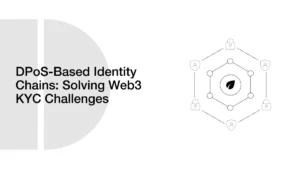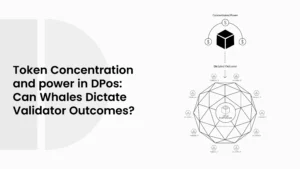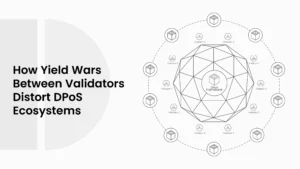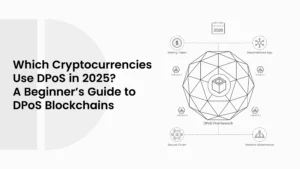How Can Micro-Delegation in DPoS Blockchains Empower Retail Investors
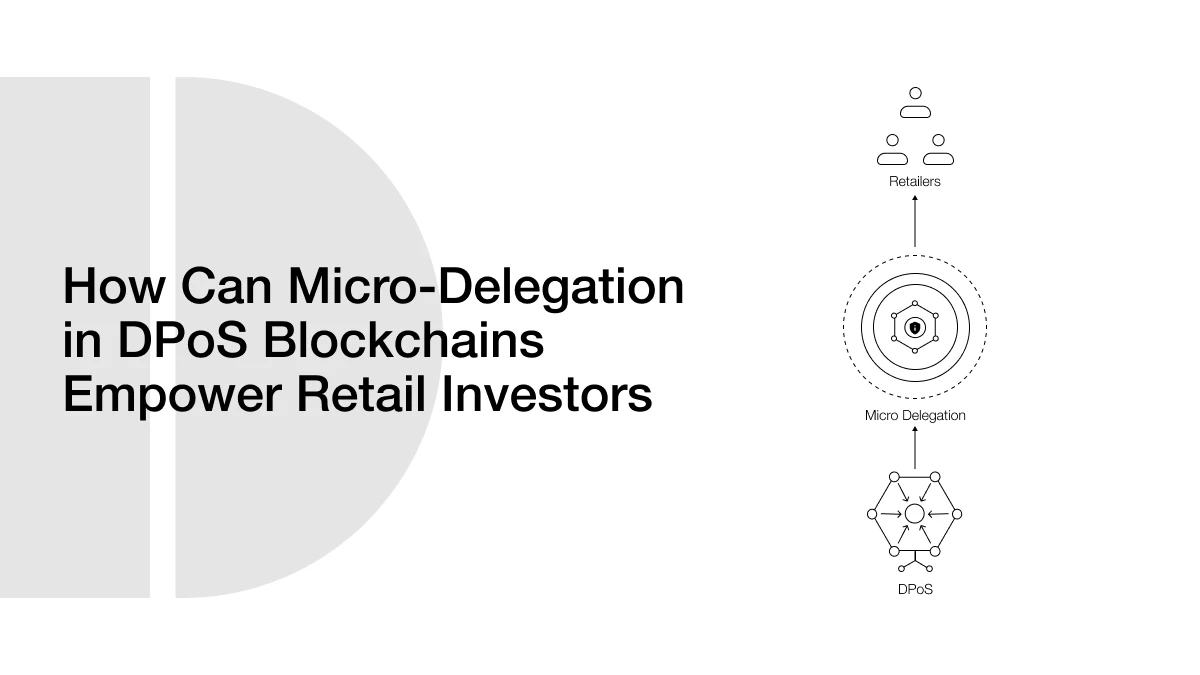
Blockchain is going mainstream at a brisk pace now, but not everyone understands yet how decisions are made on these networks. Some people think only big investors or tech experts can control things. That’s not true anymore. A new idea called micro-delegation could give regular users more power. This blog will explain how Delegated Proof of Stake (DPoS) works and how micro-delegation helps small investors have a say. By the end, you’ll understand how you can take part in crypto voting, even if you don’t hold a lot of tokens.
- What Is Delegated Proof of Stake (DPoS)?
- Examples of DPoS in Action
- How Voting Works in DPoS Systems
- What Is Delegation of Voting Power?
- Why Big Investors Usually Win
- What Is Micro-Delegation?
- How Micro-Delegation Actually Works
- Why Micro-Delegation Matters for Small Investors
- Leveling the Playing Field
- Stronger Community, Better Decisions
- Encouraging Delegate Accountability
- Benefits of Micro-Delegation in Crypto Governance
- More Decentralized Voting
- Better Delegate Accountability
- More Inclusive Governance
- Challenges of Micro-Delegation
- Tech Limitations and Wallet Support
- Voter Confusion or Fatigue
- Risk of Fake Validators or Vote Farming
- How to Use Micro-Delegation as a Retail Investor
- Step 1: Choose the Right Blockchain
- Step 2: Pick a Wallet or Platform That Supports It
- Step 3: Research Your Delegates
- Step 4: Split and Delegate
- Step 5: Monitor and Adjust as Needed
- Examples of Projects Moving Toward Micro-Delegation
- EOS: One of the First to Use DPoS
- TRON: A Super Representative System with Voting Pools
- SUI and Newer DPoS Chains
- The Future of Voting Power in DPoS
- AI and Automation in Delegation
- Micro-Communities and Delegate Networks
- Potential Regulations and Standards
- Conclusion
- Frequently Asked Questions (FAQs)
- Glossary of Key Terms
Many retail investors (people with smaller investments) feel left out of crypto governance. They don’t vote, or they don’t know how. Big holders make most of the decisions. But micro-delegation can change that. It allows small investors to still have a voice by splitting voting power into tiny parts. With more tools and platforms supporting micro-delegation, this feature could bring a big shift in crypto fairness and transparency.
What Is Delegated Proof of Stake (DPoS)?
Delegated Proof of Stake (DPoS) is a way blockchain networks agree on what is true. It’s called a consensus mechanism. With DPoS, coin owners (known as token holders) elect a small number of people (known as delegates or validators) to maintain the network. The role of these delegates is to verify transactions, append new blocks, and maintain all of it secure. The greater the number of votes that a delegate receives, the more credible they are. In case a delegate is performing poorly, users can eliminate them through voting in favor of another person.
In older systems like Proof of Work (PoW) (used by Bitcoin), computers compete to solve hard puzzles. This consumes a lot of energy. Then came Proof of Stake (PoS), where anyone with tokens could help validate blocks just by staking coins. But DPoS is a lot more advanced. Instead of everyone helping, the community votes for a few people to do the job. This is faster, consumes less power, and is easier to scale. But it also means voting becomes very important, and that’s where problems start when only big investors vote.
ALSO READ: Can Social Reputation Fix Delegate Elections in DPoS Blockchains?
Examples of DPoS in Action
Many popular blockchains use DPoS. For example:
| Blockchain | Delegates/Validators | Voting System | Notes |
| EOS | 21 Block Producers | Token holders vote for top 21 delegates | Fast and scalable, but power often stays with top token holders |
| TRON | 27 Super Representatives (SRs) | Users vote for SRs every cycle | Cost-effective, but top SRs often hold most control |
| SUI | Fixed set of validators | Token-based validator selection | Built for speed, micro-delegation support may grow with platform updates |
These blockchains are fast and efficient. However, over time, people realized that most voting power remains with the wealthiest individuals, which is where micro-delegation comes in to balance things out.
How Voting Works in DPoS Systems
In a DPoS system, every token holder has the right to vote. But instead of voting on every decision, they vote for a delegate or a block producer. This person or group then makes decisions and validates transactions on behalf of the voters.
Voting is usually done using your wallet or the blockchain’s website. You connect your wallet, choose a delegate, and lock in your vote. The more tokens you own, the more weight your vote carries. That’s why big investors often have a lot more power than small investors.
What Is Delegation of Voting Power?
Not everyone wants to be involved in voting all the time. Some people don’t understand how it works or don’t have the time. That’s where delegation comes in. You can delegate your voting power to someone else who will vote on your behalf.
Think of it like choosing a class representative. You don’t vote on every rule in school; you pick someone to do it for you. In DPoS, token holders delegate their voting rights to trusted validators, and those validators keep the network secure.
This system is efficient. It keeps things running fast. However, it can also create problems when most of the power is concentrated in a few top delegates. That’s where micro-delegation offers a better option, especially for small investors who want more control.
Why Big Investors Usually Win
In many DPoS networks, power follows money. If someone owns a lot of tokens, they can vote with more weight. That means they can easily get their favorite delegate elected, or keep the same delegate in power for years.
This makes the system feel less fair. Smaller investors may feel like their vote doesn’t matter. Many don’t even bother to vote. As a result, a few wealthy wallets control most of the network’s governance. This leads to centralization, the opposite of what blockchain is supposed to be.
That’s why micro-delegation is so important. It can help spread power more evenly and bring real decentralization back to DPoS.
What Is Micro-Delegation?
Micro-delegation is not a complicated concept: it allows individuals to divide their voting rights into small units and delegate them to multiple delegators, not necessarily one. Therefore, you can diversify your tokens instead of loading them all up on one validator. This gives your vote more freedom and your power more equal. Consider, as an example, that you have 100 tokens. In conventional DPoS, you would give all 100 to a single individual. However, when you micro-delegate, you send 40 to one delegate, 30 to another, and 30 to a third. This lets you support multiple good candidates and not put all your trust in one place.
For small investors, micro-delegation is a game-changer. In normal DPoS systems, their vote might feel too small to matter. But when micro-delegation is allowed, they can team up with others, support different validators, and have more control over how their voice is used. This method also lowers the risk. If one delegate turns out to be bad or lazy, only part of your vote is wasted, not all of it. You still have other validators working hard on your behalf. It’s a safer and smarter way to take part in crypto governance.
How Micro-Delegation Actually Works
To use micro-delegation, you need a blockchain or wallet that supports it. Some DPoS networks are adding this feature, and new wallets are making it easier. These platforms often let users:
- Set percentages of their voting power
- Choose more than one validator
- Change their votes anytime, without big fees
Think of it like building a custom team. You choose who to trust, and you control how much power each one gets. For regular users, this is the best way to stay involved without giving up full control.
Why Micro-Delegation Matters for Small Investors
Leveling the Playing Field
In most DPoS systems, big wallets dominate the vote. This means large investors or companies can easily push their favorite delegates into power, often leaving small investors with no real influence. Micro-delegation changes that by giving everyone, even those with small holdings, a fairer way to participate.
When users can split their vote among multiple validators, they don’t need to “go all in” on one candidate. This encourages more thoughtful voting and lets even small votes count toward good delegates. It helps reduce the control of a few whales and builds a healthier, more democratic system.
ALSO READ: The Future’s Here | How Multi-Chain DPoS Voting Could Optimize Electoral Processes
Stronger Community, Better Decisions
Micro-delegation opens up room to involve more people. Small investors are more likely to invest when they feel that they have a say. The result is enhanced participation, improved communities, and more credible governance.
When just 10 people make all the decisions in your town, things may not go well with everybody. However, when hundreds of people contribute ideas and vote, a system is fairer and useful. This is made possible by micro-delegation in blockchain networks.
Encouraging Delegate Accountability
When voting is spread out across many users and delegates, it’s harder for bad actors to stay in power. Delegates now have to prove they’re doing a good job, not just to one rich investor, but to hundreds or thousands of small voters.
Failure to play well may see them lose the backing of many of the smaller wallets in the short run. This increases the pressure on delegates to be responsible, transparent, and serve the entire network, not only some whales. Through this, micro-delegation contributes to the establishment of a much more powerful system of accountability.
Benefits of Micro-Delegation in Crypto Governance
More Decentralized Voting
Micro-delegation helps move power away from just a few rich players. By letting everyone, even small token holders, split their vote, DPoS networks can become more decentralized. When more people vote and more validators receive support, no single group can take full control of the system.
This also protects the network from manipulation. In systems where only a few big voters dominate, it’s easier for bad actors to cheat or push unfair changes. Micro-delegation spreads out the power, making it harder to game the system.
Better Delegate Accountability
When many users delegate their votes across multiple validators, it’s easier to track who’s doing a good job. A delegate can’t just rely on one or two major supporters. They must keep a strong reputation across the whole community.
Micro-delegation gives voters more freedom to switch support. If a validator isn’t active or starts acting selfishly, small investors can quickly move their votes elsewhere. This puts pressure on delegates to stay honest, work hard, and always act in the network’s best interest.
More Inclusive Governance
With micro-delegation, everyone has a chance to take part, regardless of the number of tokens they own. It’s no longer about “big fish only.” It’s about every voice counting. This makes crypto governance more open, inclusive, and fair.
This also implies that regardless of the region of the world one lives in, whether a student, worker, or hobbyist, they can contribute to the future of their preferred blockchain projects. They can vote and keep the delegates in check, and all this does not require a massive investment.
Challenges of Micro-Delegation
Tech Limitations and Wallet Support
Even though micro-delegation sounds great, not all crypto platforms support it yet. Some DPoS blockchains still use basic voting systems that only allow one delegate per user. Others may not have wallets that let you split your vote.
This is a problem: when the tools are not available, small investors cannot use micro-delegation, even when they would like to. To make micro-delegation accessible to all, developers need to develop superior tools, such as flexible staking dashboards and user-friendly wallets.
Voter Confusion or Fatigue
Not everyone wants to spend time researching validators. Most retail investors don’t even vote. They buy tokens, store them, and forget. If micro-delegation requires too much effort, people may avoid it.
This is called voter fatigue, when there are too many choices or it’s too hard to decide. Some users may also feel confused by percentages, wallet settings, or multiple validator lists. Without clear guidance or automation, many small investors might still stay out of governance.
Risk of Fake Validators or Vote Farming
Another risk is that bad actors could create multiple fake validator accounts and trick small investors into delegating to them. This could be done using fancy websites, fake promises, or misleading reward systems. This is sometimes called vote farming.
Without a strong reputation system or community review process, it becomes easier for these fake validators to collect votes from many small users. Micro-delegation can only succeed if voters have tools to see who’s honest and who’s not.
How to Use Micro-Delegation as a Retail Investor
Step 1: Choose the Right Blockchain
First, make sure the blockchain you’re using supports micro-delegation or flexible delegation. Not all DPoS networks allow you to split your vote. Some networks like EOS, Tezos, or SUI have started experimenting with delegation options, but tools vary across ecosystems.
Check the official website or wallet of the blockchain to see if it has:
- Multi-delegate support
- Adjustable vote percentages
- Easy switching between delegates
If these features exist, you’re in the right place to start micro-delegating.
Step 2: Pick a Wallet or Platform That Supports It
Next, you’ll need a wallet or staking platform that makes micro-delegation simple. Some wallets come with built-in features to:
- Delegate to multiple validators
- Set voting weights (like 50%, 25%, etc.)
- Change your vote at any time
Seek out non-custodial staking platforms (you hold your tokens), with transparent statistics on the performance of validators. You will be able to make intelligent decisions without surrendering control that way.
Step 3: Research Your Delegates
Don’t just pick random names. Check out each delegate’s:
- Uptime (how often they’re online)
- Voting history
- Community involvement
- Reward-sharing policy
Many platforms show this data right on the dashboard. Choose a mix of reliable validators, not just the most popular ones. This spreads your risk and supports decentralization.
Step 4: Split and Delegate
Once you’ve picked your validators, decide how to divide your tokens. For example:
- 40% to a well-known validator
- 30% to a community-backed validator
- 30% to a new but promising validator
Most platforms let you enter these percentages and confirm in one click. Once done, you’ve officially used micro-delegation.
Step 5: Monitor and Adjust as Needed
Just like voting in real life, it’s good to check in regularly. Some validators may stop performing well or change their policies. You can always adjust your vote to support someone better.
Micro-delegation puts you in control. But that control only works if you stay involved, even just once a month.
ALSO READ: How DPoS and Modular Design Make Faster, Flexible, Secure, and Future-Proof Blockchains
Examples of Projects Moving Toward Micro-Delegation
EOS: One of the First to Use DPoS
EOS is one of the earliest and most well-known blockchains to use the Delegated Proof of Stake consensus mechanism. It allows users to vote for 21 block producers who manage the network. While traditional EOS voting didn’t allow vote-splitting at first, the community has pushed for proxy voting and tools that simulate micro-delegation.
Several wallet providers now let users delegate through a proxy, which then splits votes across multiple validators based on community decisions. This isn’t true micro-delegation yet, but it’s a step in the right direction, especially for retail investors.
TRON: A Super Representative System with Voting Pools
In TRON, users vote for Super Representatives who are responsible for validating blocks. While traditional TRON voting leans heavily on big holders, some community tools now allow users to join voting pools that behave like soft micro-delegation.
In these pools, votes from many small users are collected and spread out, giving more balanced power to multiple candidates instead of just one. TRON’s community is also exploring ways to bring fairer distribution to its voting rewards.
SUI and Newer DPoS Chains
SUI, a newer DPoS chain, is built by former Meta engineers and offers high-speed transactions with flexible validator sets. While micro-delegation is not yet native to SUI, the design of its validator selection system opens the door for vote-splitting features in future upgrades or through third-party wallets.
As the DPoS ecosystem grows, newer chains are expected to build micro-delegation directly into their design, especially to attract more active retail participation.
The Future of Voting Power in DPoS
AI and Automation in Delegation
In the near future, AI-powered tools will be seen helping users choose the best delegates automatically. These tools might scan validator performance, uptime, community trust, and reward history. Then, they could suggest or auto-assign your voting power to a group of validators who meet your goals, like security, reward sharing, or decentralization.
This kind of smart micro-delegation will make it even easier for small investors to take part, especially those who don’t have time to research every detail. With automation, governance participation becomes smarter and simpler.
Micro-Communities and Delegate Networks
As micro-delegation becomes more common, there is a chance to see the rise of micro-communities around certain validators. People may form groups or DAO-style networks where they vote together, support ethical delegates, and share voting strategies.
These groups could use messaging apps, forums, or even blockchain-based tools to coordinate. For small investors, being part of a group can boost confidence and improve decision-making in governance. It also spreads awareness about who’s doing a good job, and who’s not.
Potential Regulations and Standards
As crypto grows, so will interest from regulators. One day, DPoS systems might have to follow standards for fairness and transparency, especially if used in financial or government systems. In this case, micro-delegation may become a key part of those rules, making sure all users, not just big whales, can take part in votes.
Blockchain platforms that adopt micro-delegation early could gain more trust from both users and regulators. It shows that they care about true decentralization, not just fast speeds and big profits.
Conclusion
Delegated Proof of Stake (DPoS) has made blockchain networks faster and more efficient. But in many cases, governance power remains in the hands of a few large investors. That’s not what decentralization is supposed to be about.
Micro-delegation brings a powerful solution. By allowing retail investors to split their voting power and support multiple delegates, it brings fairness back into crypto governance. Small token holders finally have a way to influence decisions, keep validators accountable, and participate without needing a huge wallet.
The future of blockchain depends on real inclusion. And for DPoS networks to truly live up to their promise, they must make room for tools like micro-delegation, tools that turn passive investors into active participants. If you’re a retail investor in crypto, now is the time to get involved, delegate smartly, and help build a more open, fair, and decentralized future.
Frequently Asked Questions (FAQs)
- What is DPoS in simple words?
DPoS stands for Delegated Proof of Stake. It’s a system where people vote for a few trusted delegates to run a blockchain. These delegates validate transactions and keep the network safe.
- Can small crypto investors vote in DPoS systems?
Yes, but their vote is often small. Micro-delegation helps small investors split their vote and have more control in the system.
- What does micro-delegation mean in crypto?
Micro-delegation means dividing your voting power into smaller parts and giving it to more than one delegate. It lets you support multiple validators instead of just one.
- Why does DPoS sometimes become centralized?
Because big investors control most tokens, they have more voting power. This can lead to only a few delegates staying in control, which reduces decentralization.
Glossary of Key Terms
- DPoS (Delegated Proof of Stake): A consensus mechanism where users vote for delegates to validate blockchain transactions.
- Validator/Delegate: A person or node elected by token holders to manage the blockchain.
- Voting Power: The influence your tokens give you in selecting validators.
- Retail Investor: A regular person who invests small amounts in crypto, not a company or large fund.
- Micro-Delegation: A method of splitting voting power among multiple validators.
- Decentralization: The idea that no single group should control a blockchain.
- Governance: How decisions are made in a blockchain network.
- Staking: Locking up your tokens to help secure the network and earn rewards.

